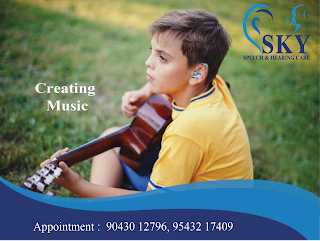Hearing aids play a significant role in enhancing the happiness and enjoyment of listening to music for individuals with hearing impairments. Here's why they are important:
1. **Access to Sound:** Hearing aids amplify sounds, making them audible for people with hearing loss. This increased access to various sounds, including music, allows individuals to engage more fully with their auditory surroundings and experience the joy of music.
2. **Emotional Connection:** Music is often tied to emotions and memories. People associate songs with specific moments in their lives, and being able to hear and enjoy music through hearing aids can help create a stronger emotional connection to those memories and feelings.
3. **Quality of Life:** Engaging with music contributes to a higher quality of life. It's not just about the auditory experience but also the emotional and social aspects. Music can improve mood, reduce stress, and foster a sense of belonging and connection with others, all of which contribute to overall happiness.
4. **Social Interactions:** Music is a common topic of conversation and a shared interest among people. Being able to participate in discussions about music and share musical experiences with friends and family can enhance social interactions and relationships, leading to increased happiness.
5. **Cognitive Stimulation:** Listening to music stimulates the brain, which is beneficial for cognitive health. It can help individuals with hearing aids maintain cognitive function and prevent feelings of isolation that can arise from hearing loss.
6. **Enjoyment of Artistry:** Music is a form of art, and being able to appreciate the intricacies of melodies, harmonies, and lyrics adds depth to the listening experience. Hearing aids enable individuals to enjoy the nuances and artistic elements of music that might otherwise be missed.
7. **Personal Fulfillment:** Many people derive personal fulfillment and a sense of identity from their musical preferences. Being able to engage with music aligns with one's personal interests and passions, contributing to a sense of self and overall happiness.
8. **Sense of Normalcy:** Hearing aids help individuals with hearing loss feel more connected to the world around them. Listening to music is a normal and enjoyable activity for many people, and hearing aids allow those with hearing impairments to participate in this activity just like anyone else.
9. **Reduced Isolation:** Hearing loss can lead to feelings of isolation and exclusion from social and recreational activities. By enabling individuals to enjoy music, hearing aids can help combat these feelings and promote a more active and engaged lifestyle.
10. **Mental and Emotional Well-being:** Music has the power to uplift, inspire, and soothe. For people with hearing loss, the ability to experience these emotional benefits through hearing aids can contribute significantly to their mental and emotional well-being.
In summary, hearing aids can greatly enhance the happiness of individuals with hearing impairments when it comes to listening to music. By providing access to the world of sounds, emotions, and social interactions that music offers, hearing aids play a pivotal role in improving the overall quality of life for those who love music.








